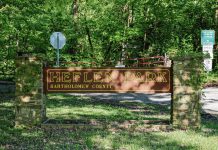Bartholomew County officials have slashed the county’s general fund budget deficit to $700,000 from $2 million, but more cuts will be needed to avoid a financial shortfall.
County council member Chris Ogle reminded his fellow council members that the county will still be in a financial hole next year unless more steps are taken, despite spending four hours cutting the budget during a meeting Tuesday night.
“We’re still going to have to investigate revenues,” Ogle said. “This isn’t going to cut it.”
If a new tax is created with two separate ordinance readings with at least two public hearings, it will have to be completed by Nov. 1 in order to provide revenue next year, council member Mark Gorbett said.
[sc:text-divider text-divider-title=”Story continues below gallery” ]
The council decided Tuesday to withdraw $2 million appropriated on July 14 to construct a new Bartholomew County Annex Building.
Instead, that money will be returned to the county’s reserve fund, which had been reduced from $5 million to $2 million during the past year, council members said.
The council also voted to move $4.7 million from the general fund next year into the employee benefit health care trust to cover health care costs, which continues to be the largest drain on the self-insured county’s finances.
While that’s a million fewer dollars than the Bartholomew County commissioners had requested, the council also placed $1.2 million from the county’s adjusted gross income tax (CAGIT) into an account designed to shore up the trust fund.
That action is expected to result in significant savings by lowering premiums for what’s called “reinsurance,” which reimburses the county whenever health care expenses go over a specified limit.
Earlier in the meeting, commissioner Chairman Larry Kleinhenz said the county commissioners will be able to work with whatever amount the council provided.
Based on consultations from two different insurance consultants, the commissioners offered the council their own recommendations toward reducing health care costs.
The suggestions include doubling the deductible from 7 percent to between 14 and 15 percent, which is in line with what the private sector requires of its workers, Kleinhenz said.
County employees would also be asked to pay 20 percent of total insurance premiums, Kleinhenz said.
The commissioners also intend to bid out administrative services for the insurance program that have been provided by fund administrator Dunn and Associates and broker Greg Fox for several years.
The suggestions, which Kleinhenz said could result in a savings of up to $700,000 next year, were taken under advisement by the council.
Council member Laura DeDomenic opened Tuesday night’s budget discussions by providing four pages of potential savings she had devised on her own.
“It’s a starting point,” DeDomenic said. “We need to do something other than finger-pointing and arguing.”
DeDomenic’s list contained more than 30 recommendations, such as permanently reducing the county’s workforce by 10 jobs by not replacing workers who leave voluntarily.
Although DeDomenic initially claimed the recommendations could save up to $3.1 million, county auditor Barb Hackman pointed out several budget realities that DeDomenic, was unaware of as a first-year council member.
As a result, the potential savings contained in her recommendations were reduced to about $370,000, Hackman said.
But both the amount of remaining savings and the substantial effort put forward by DeDomenic was lauded by county officials and audience members alike.
Council members said Tuesday’s discussions are preliminary, and different decisions may be made at a later date.
Kleinhenz and Gorbett said they felt said the council is still focusing on short-term fixes for next year’s budget without looking at longer-term changes.
[sc:pullout-title pullout-title=”Revenue choices” ][sc:pullout-text-begin]
There are three choices the Bartholomew County Council has for generating new revenue streams.
Local option income tax
Type: Income tax already levied by 19 of Indiana’s 92 counties
Cost: Based on income. For employee making $35,000 a year, the cost would be $1.68 every week.
Stated purpose: Public safety
Amount raised if enacted (based on 2015 data): Columbus, $2.84 million; Bartholomew County, $2.06 million; Edinburgh, $118,000; Hope, $29,000; Hartsville, $2,184; Clifford, $1,203; Elizabethtown, $471. Jonesville would also receive an amount appropriate for its population.
Local Option Highway Vehicle Tax (often referred to simply as a wheel tax)
Type: User fee
Cost: Excise surtax on passenger vehicles from $7.50 to $25. A wheel tax on larger commercial vehicles between $5 and $40.
Amount raised if enacted: $1.5 million. Like the local option income tax, funds from the wheel tax would be distributed to all incorporated communities.
Disadvantage: Money is earmarked for highways only.
Cumulative capital development tax
Type: Property tax currently levied by a vast majority of Indiana counties
Cost: 4 cents per $100 of assessed valuation the first year, followed by up to 7 cents annually in subsequent years
Amount raised: $1.4 million annually, beginning in the second year
Disadvantages: 25 percent of money raised through the cumulative capital development tax must be applied toward property-tax relief. In addition, the county would be required to move $694,000 from its general fund into the cumulative capital development fund the first year.
[sc:pullout-text-end][sc:pullout-title pullout-title=”What’s next?” ][sc:pullout-text-begin]
The Bartholomew County Council is expected to soon confirm a date and time for its next budget review, which likely will be conducted in about two weeks. The second reading and adoption of the 2016 budget is currently scheduled for Oct. 13. The council meets in its chambers on the fourth floor of the Bartholomew County Government Office Building near Third and Franklin streets.
[sc:pullout-text-end]




